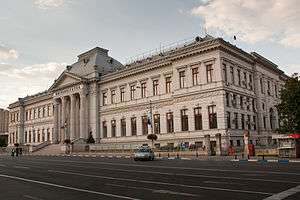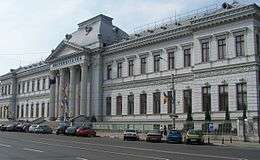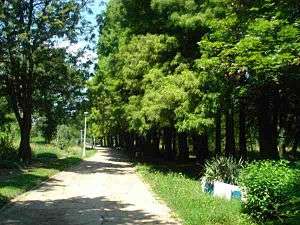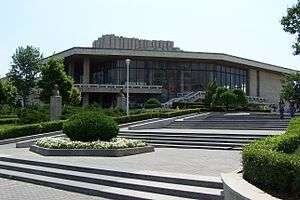University of Craiova
| Universitatea din Craiova | |
|
Seal of the University of Craiova | |
| Latin: Universitas Craiovensis | |
| Motto | Vita sine litteris mors est |
|---|---|
Motto in English | Life without literature is death |
| Type | Public |
| Established |
1947 – Establishment[1][2] 1965 – University Status[3][4] |
| Budget | € 15.98 million (2013)[5] |
| Rector | Dan Claudiu Dănișor[6] |
Academic staff | 2,000[7] |
| Students | 25,031 (2002)[8] |
| Address |
13 Al. I. Cuza Str., 200585 Craiova, Craiova, Romania 44°19′09″N 23°48′03″E / 44.31917°N 23.80083°E |
| Campus | Urban |
| Colours | Yellow & White |
| Nickname | UCV |
| Affiliations | EUA |
| Website |
www |
 | |
The University of Craiova (Romanian: Universitatea din Craiova) is a public university located in Craiova, Romania. Founded in 1947, with 4 institutes at the beginning, in the Palace of Justice of Craiova. It is the largest university in the historical Oltenia province of Romania. It was the last university established in the Kingdom of Romania.[2] It was the fifth university in Romania officially approved by the Ministerial Council of the Socialist Republic of Romania in 1965,[4][9] with 7 faculties: Mathematics, Philology, Electrotechnics, Agriculture, Horticulture, Chemistry and Economics.[8] The university is a member of the European University Association. It currently includes a total of 16 faculties and 2 colleges for undergraduate and postgraduate programms. Professor Dan Claudiu Dănișor is the University's 12th Rector since 2012.[6][10] The university is governed by a 7-member Vice-Rector.[11] The university is internationally known by its football club FC Universitatea Craiova.
History
Establishment
The idea of founding a higher school in Craiova was flagged in the 18th century by Nicolae Bălcescu, the leader of the Wallachian Revolution of 1848. The establishment of the University of Craiova put in a proposal by Ion Heliade Rădulescu in 1848. But, the failure of the Wallachian Revolution of 1848 did not allow an immediate implementation of this plan. Almost a century later, its establishment was approved based on Act 138/25 April 1947 in the Official Bulletin of the Kingdom of Romania.[2] The Faculty of Agriculture and the Agricultural Institute were established in 1947 and 1948, respectively.[12] The Technical Institute and the Pedagogical Institute were also established in 1951 and 1959, respectively. The Pedagogical Institute of Craiova included four teaching faculties, namely Philosophy, Mathematics, Physics & Chemistry, and Natural Sciences.[13]

Status as a university
According to the Act No.894/27 August 1965 approved by the Ministerial Council of the Socialist Republic of Romania, the University of Craiova was officially established with 7 faculties: Mathematics, Philology, Electrotechnics, Agriculture, Horticulture, Chemistry and Economics.[13] The agreement dissolved the Agricultural Institute, and its facilities were transferred to the Faculty of Agriculture and the Faculty of Horticulture. Moreover, the Pedagogical Institute of Craiova was divided into the Faculty of Letters, the Faculty of Theology, the Faculty of Social Sciences, and the Faculty of Natural Sciences.
In 1970, the Faculty of Medicine was established. In 1998, it seceded to become the University of Medicine and Pharmacy of Craiova. This has been ranked as one of the best universities for medicine in Romania, and has gained in popularity among students due to its six-year program and no entrance exam.[14]
In 1974, the Faculty of Natural Sciences was divided into the Faculty of Mathematics, the Faculty of Chemistry and the Faculty of Physics. The Faculty of Mathematics later became the Faculty of Mathematics and Natural Sciences in 1991.
By 1989 it consists of the following faculties:
- Faculty of Natural Sciences: programs in Mathematics, Informatics and Physics.
- Faculty of Letters: programs in Literature and Foreign Languages (Romanian, English, French, Russian).
- Faculty of Economy and Business Administration: programs in Economy, Finance, Accounting, and Agricultural Economy.
- Faculty of Medicine: programs in General Medicine.
- Faculty of Electrical Engineering: programs in Electrical Engineering, Automation Technology, Computer Science, and Electromechanics.
- Faculty of Mechanical Engineering: programs in Mechanical Engineering, Industrial Engineering, and Agricultural Engineering.
In 1990, its development was characterized by restructuring administrative offices, introducing new faculties, computerizing administrative process and improving faculties, in order to become a member of the European University Association.
Since 1991, the University of Craiova has two campuses: Craiova and Drobeta-Turnu Severin. The Craiova campus includes technology, economics, informatics and secretarial work, while the Drobeta-Turnu Severin campus has administration and informatics.[15]
Timeline chronology
| Year | Establishment |
|---|---|
| 1947 | Act 138/25 April 1947 in the Official Bulletin of the Kingdom of Romania |
| 1948 | Faculty of Agriculture and Agricultural Institute |
| 1951 | Technical Institute |
| 1953 | Agricultural Institute Botanical Garden |
| 1959 | Pedagogical Institute |
| 1961 | Faculty of Social Sciences |
| 1965 | Act No.894/27 August 1965 by the Ministerial Council of the Socialist Republic of Romania |
| 1966 | University Library and Student Accommodation |
| 1970 | Faculty of Medicine |
| 1972 | The Museum of the History of Medicine |
| 1977 | Faculty of Mechanical Engineering |
| 1979 | Alpine Botanical Garden in Parâng Mountains |
| 1981 | University IT Centre |
| 1991 | Faculty of Law and Administrative Sciences |
| 1992 | Faculty of Theology |
| 1994 | University Printing House |
| 1995 | Faculty of Physical Education and Sports |
| 1996 | University TV station |
| 1998 | University of Medicine and Pharmacy of Craiova |
Main Building

The main building of the University of Craiova called wing A, is located in the central region of Craiova. Its construction was finished in 1896, and was designed as Neoclassical architecture by architect Ion N. Socolescu. It was used for the Palace of Justice of Craiova. After its transference to the University, it had several internal modifications.
The main building is made up of two different U-shaped wings united by a central wing, delimitating the two interior courtyards. The main entrance, the entire exterior, and the interior architecture were designed as classical architecture. In 1972, a new wing was added to the main building, which became the university library. Over the time, the entrances has been relocated, to make easy access to faculties and rooms. Some supplementary spaces have been created through the construction of separating walls.
In 1977, when the main building was reconstructed, some faculties (Agriculture, Mechanical Engineering, and Medicine) were relocated to different buildings.
Since 1998, the classrooms, laboratories, offices were decorated and modernized. The consolidation of the eastern wing of the main building started in 1996 and was finished in 2002. A cafeteria has been built in the basement of the building. In 2002, the Blue Hall and the Central Hall were renovated and modernized.
Currently, 8 of 17 faculties are still located at the main building:
- Faculty of Law and Administrative Sciences
- Faculty of Physics
- Faculty of Letters
- Faculty of Mathematics and Natural Sciences
- Faculty of Horticulture
- Faculty of Social Sciences
- Faculty of Theology
- Faculty of Economy and Business Administration
The main building now includes 35 classrooms, 16 seminar halls, 21 laboratories, and 1 workshop room.
Academic profile
School statistics
The number of the students enrolled at the University of Craiova rose dramatically since 1947. It makes 4.6% of the total number of Romanian students in 2000. But, it is 336 students per 10,000 inhabitants, which is larger than the average number of 238 students per 10,000 inhabitants in the country.[8]
The University of Craiova started its PhD programs in 1966. Currently, its PhD programs are supervised by 63 professors. The University has also award the honorary doctorate to more than 60 persons from different countries for their contributions to science and education.[8]
Rankings
| University Rankings | |
|---|---|
| URAP National (2014)[16] | 14 |
| SIR National (2014)[17] | 11 |
| Webometrics National (2014)[18] | 9 |
According to the University Ranking by Academic Performance (URAP), the University of Craiova was ranked as 14th in Romania and 1777th in the world in 2014.[16] Moreover, the SCImago Institutions Rankings (SIR) ranked University of Craiova in the 11th best research university among all Romanian universities and 1661st worldwide in 2014.[17] According to the SCImago Institutions Rankings (SIR), based on data collected between 2007 and 2011, University of Craiova ranked 1645 in the World, 103 regionally and number 10 in the country by number of publications.[19] Webometrics ranked the University of Craiova as the 9th university in Romania and 1787th in the world in 2014.[18] It was also ranked as the 12th university in Romania by the 4 International Colleges & Universities.[20]
Organisation and structure
Faculties
The University of Craiova comprises sixteen faculties:
- Faculty of Letters
- Faculty of Mathematics and Natural Sciences
- Faculty of Chemistry
- Faculty of Physics
- Faculty of Social Sciences
- Faculty of Theology
- Faculty of Physical Education and Sports
- Faculty of Agriculture
- Faculty of Horticulture
- Faculty of Law and Administrative Sciences
- Faculty of Economy and Business Administration
- Faculty of Electrical Engineering
- Faculty of Mechanical Engineering
- Faculty of Electromechanics Engineering
- Faculty of Automation, Computers and Electronics
- Faculty of Engineering and Management of Technological Systems
Colleges
- University College of Craiova
- University College of Drobeta Turnu-Severin
Affiliated research centers
- Research Centre for Artificial Intelligence
- Institution of Electrical and Electronics Technician Engineers (IEETE) Research Centre
- Multimedia Research/Development Centre
- Centre for Innovation and Technology Transfer
- Centre for Dialogue between Sciences and Theology
- Regional Centre for Lifelong Training in Energy
- Department of Technology and Innovation in Advanced ReseArch of Composites (TIARA-C)
- Department of Scientific Research and Programs Management
- Department of Socio-Economic and Cultural Relations
Facilities
- Agricultural Complex. The building of the Faculty of Agriculture was built in 1930. It has 7 classrooms, 36 laboratories, 2 workshops (canteen and maintenance), and students hostels (1-5).
- Mechanics Complex. This building includes two faculties, Mechanical Engineering and Chemistry. It has one carpentry workshop, experimental greenhouses, students hostels (6-9), one canteen (no. 2) and one hall (no. 2).
- Electrotechnics Complex. This building includes the Faculty of Electrical Engineering and the Faculty of Automation, Computers and Electronics. The new building are the technical and material infrastructures belonging to this complex.
- University Halls and Club. It was the Romanescu House built in the nineteenth century, which was transformed into the University Halls. It has been reconstruction, decoration and restoration. It is the most representative building in Craiova from the nineteenth century. It was reconstructed and decorated in 1903.
- Central Library. The University Library has over 1 million physical volumes.
- University TV Station. It was founded in 1995 and its TV programs started in January 1996. Its programs is broadcast accord Craiova under the acronym TELE U. It has 15 hours programs and 9 hours videotext (university-related information). Its aims is to promotes the university activities and faculties. Its news covers the most important events taking place in Oltenia.
- Students House. It was built in 1966. It initial intention was to house cultural and educative activities, and entertainment performances.
- Alpine Botanical Garden. The Botanical Garden Rânca is located in Parâng Mountains, at a height of 1550 meters, being the only botanical garden at this height. It has a wide range of European species for the practical research activities of Agriculture students and faculties.
- Craiova Botanical Garden. The Agricultural Institute Botanical Garden was opened in 1952, in order to facilitate the research activities conducted by academic staff of the faculties of agriculture and horticulture. It is also a place of entertainment. This Garden is divided in six areas: Plant Systematics, Floral Provinces of the Globe, Cultivated Plants, Seed Beds, Phytogeography of the region of Oltenia, greenhouses.
- Vila Mircea. It is located in Banu Mărăcine, suburb of Craiova. It has facilities to accommodate visiting scholars and academic staff.
Publications
Annals of the University of Craiova:
- Mathematics, Physics and Chemistry Series
- Mathematics and Computer Science Series
- Physics AUC
- Economic Sciences Series
- Electrical Engineering Series
- Automation, Computers, Electronics and Mechatronics Series
- Theology Series
- Medical Sciences Series
- Philology, English Series
- Geographies Series
- ELSE Software
- The Young Economists Journal
Sport
University Craiova Football Club was created in 1948. The team name was subsequently changed to CSU Craiova (1950), Stiinta Craiova (1950) and finally Universitatea Craiova in 1966.
Picture gallery
 Palace of Justice, 1906
Palace of Justice, 1906 Palace of Justice, 1910
Palace of Justice, 1910 Palace of Justice, 1912
Palace of Justice, 1912 Palace of Justice, 1915
Palace of Justice, 1915 Univ. Main Building, 2008
Univ. Main Building, 2008
Partner Universities
The University of Craiova participates in the European educational programs and performs cooperation and student exchanges with other institutions abroad. The University works towards extending collaborations and improving the pedagogical experience of both professors and students. It has signed cooperation agreements with the following international universities:[21]
.svg.png) Universite Libre de Bruxelles, Belgium
Universite Libre de Bruxelles, Belgium.svg.png) Katholieke Universiteit Leuven, Belgium
Katholieke Universiteit Leuven, Belgium Pädagogisches Institut des Bundes, Austria
Pädagogisches Institut des Bundes, Austria Universität Bielefeld, Germany
Universität Bielefeld, Germany Fachhochschule Bochum, Germany
Fachhochschule Bochum, Germany Hamburger Universität für Wirtschaft und Politik, Germany
Hamburger Universität für Wirtschaft und Politik, Germany Universidad Autonoma de Madrid, Spain
Universidad Autonoma de Madrid, Spain Universidad de Sevilla, Spain
Universidad de Sevilla, Spain ESIGETEL, France
ESIGETEL, France Joseph Fourier University (Grenoble I), France
Joseph Fourier University (Grenoble I), France Paul Valéry University, Montpellier III, France
Paul Valéry University, Montpellier III, France Pierre and Marie Curie University (Paris VI), France
Pierre and Marie Curie University (Paris VI), France École Supérieure d'Ingénieurs en Électronique et Électrotechnique, France
École Supérieure d'Ingénieurs en Électronique et Électrotechnique, France Institut National Polytechnique de Grenoble, France
Institut National Polytechnique de Grenoble, France Paul Sabatier University (Toulouse III), France
Paul Sabatier University (Toulouse III), France National Polytechnic Institute of Toulouse, France
National Polytechnic Institute of Toulouse, France University of Burgundy, France
University of Burgundy, France Aristotle University of Thessaloniki, Greece
Aristotle University of Thessaloniki, Greece University of L'Aquila, Italy
University of L'Aquila, Italy University of Perugia, Italy
University of Perugia, Italy Universita degli Studi di Torino, Italy
Universita degli Studi di Torino, Italy University of Groningen, Netherlands
University of Groningen, Netherlands Universidade Catolica Portuguesa, Portugal
Universidade Catolica Portuguesa, Portugal University of Helsinki, Finland
University of Helsinki, Finland Lappeenranta University of Technology, Finland
Lappeenranta University of Technology, Finland University of Luton, UK
University of Luton, UK
Faculty, alumni and rectors
Faculty and alumni of the university include:
- Ana Maria Brânză, a Romanian épée fencer, got a MSc from the University of Craiova in 2007.
- Nicolae Ungureanu, a retired Romanian football defender
- Lia Olguța Vasilescu, a Romanian politician, member of the Social Democratic Party (PSD) and mayor of Craiova since June 2012, graduated from the Faculty of Social Sciences at the University of Craiova.
- Ilie Sârbu, a Romanian theologian, economist and politician, got a degree in Management from the Faculty of Economics at the University of Craiova in 1998.
- Mile Cărpenișan, journalist, war correspondent, studied at the Faculty of Management at the University of Craiova.
Rectors:
- Andrei Moraru (1948-1952)
- Ion Lungu (1952-1955)
- Alexandru Buia (1955-1964)
- Marius Preda (1966-1968)
- Mircea Oprean (1968-1971)
- Titus Georgescu (1971-1974)
- Tiberiu Nicola (1974-1981)
- Silviu Pușcașu (1981-1984)
- Tiberiu Nicola (1984-1989)
- Mircea Ivănescu (1990-2004)
- Ion Vladimirescu (2004-2012)
- Dan Claudiu Dănișor (2012-)
References
- ↑ Based on Act 138/25 April 1947 in the Official Bulletin of the Kingdom of Romania.
- 1 2 3 Foundation of the University of Craiova
- ↑ Based on Act No.894/27 August 1965 by the Council of Ministers of the Socialist Republic of Romania.
- 1 2 Cronologia Dezvoltarii Universitatii din Craiova
- ↑ Romanian Academic Education Funding Trends - Case of the University of Craiova
- 1 2 University of Craiova: Rector
- ↑ University of Craiova
- 1 2 3 4 University of Craiova Statistics
- ↑ Iasi (1860), Bucharest (1864), Cluj (1959), Timisoara (1962), Craiova (1965), Brasov (1971)
- ↑ University of Craiova: Rectors Gallery
- ↑ University of Craiova: Vice-Rectors
- ↑ The Monograph of the University of Craiova, 2008, Universitaria Publishing House, Beladi Publishing House, coordinated by:VLADIMIRESCU, ION; OTOVESCU, DUMITRU
- 1 2 1947-1965 History (Romanian)
- ↑ 1990-2013 History (Romanian)
- ↑ University Of Craiova
- 1 2 "URAP Ranking 2014, Romania". Retrieved 2015-01-17.
- 1 2 Scimago Institutions Rankings
- 1 2 Ranking Web of World Universities, 2014, http://www.webometrics.info/en/search/Rankings/craiova%20type%3Apais. Downloaded 17 January 2015.
- ↑ Scimago Institutions Rankings
- ↑ University Web Ranking 2014, http://www.4icu.org/reviews/3936.htm Downloaded 17 January 2015.
- ↑ http://cis01.central.ucv.ro/socrates/pages/parteneri.html

